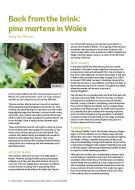
In the ancient wildwoods that once blanketed much of Britain, the pine marten was one of our most common carnivores, but today the story is rather different. Written by VWT’s Pine Marten Recovery Project Officer, Jenny MacPherson, for the Woodland Trust’s Magazine ‘WoodWise’.
Download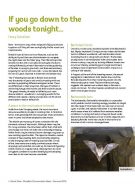
VWT’s Henry Schofield reports on the ecological needs and requirements of Britain’s bats in the Woodland Trust’s ‘WoodWise’ magazine.
Download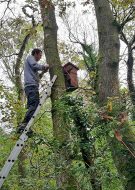
This paper presents the results on the provision and occupancy of pine marten den boxes in Galloway Forest, Scotland. 50 den boxes were installed in order to increase the availability and diversity of suitable den sites for breeding female martens and aid monitoring of the marten population. A proportion of the boxes was occupied by martens every year and the boxes were used by breeding females to raise their young.
Download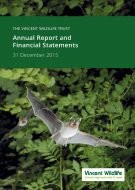
This report outlines our achievements in 2015, explains our governance arrangements and outlines our future plans. The VWT’s audited financial statements for 2015 provide financial details of our work during the year and how it was funded.
Download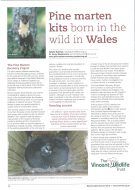
It’s official – pine marten kits have been born in Wales. The pine marten carries the title of Britain’s second rarest carnivore after the wildcat, making these births a very significant moment in the conservation of this native mammal. Written for The Mammals Society’s ‘Mammal News’.
Download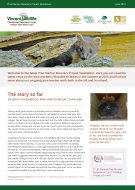
Welcome to the latest Pine Marten Recovery Project Newsletter. Here you can read the latest news on the pine martens relocated to Wales in the autumn of 2015 and find out more about our ongoing pine marten work both in the UK and in Ireland.
Download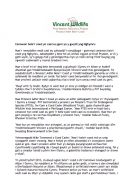
Mae’r newyddion wedi cael eu cyhoeddi’n swyddogol – gannwyd cenawon bele’r coed yng Nghymru. Adnabyddir y bele fel ail anifail cigysol prinnaf Prydain, ar ôl y gath wyllt, sy’n golygu fod y genedigaethau hyn yn nodi carreg filltir bwysig yng ngwaith cadwraeth y mamal brodorol hwn.
Download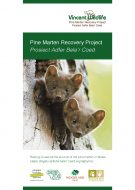
The Vincent Wildlife Trust (VWT), with its 30-year history of pine marten research, is currently boosting Wales’ struggling marten population. Following an extensive feasibility study and consultation with local landowners and communities, 20 pine martens were caught in Scotland and released into an area of mid-Wales in autumn 2015.
Download
Polecat distribution surveys at ten-year intervals have been recommended in order to monitor changes in polecat distribution. The aim of this survey was to gather up-to-date information on the distribution of polecats and polecat-ferrets during the period 2014-2015.
Banner photo: ©Nikki Charlton
Download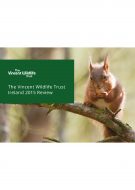
This review is devoted to the Trust’s work in Ireland and outlines our achievements in 2015. It also gives a brief financial synopsis and summarises our future plans.
Download